
Life can be as beautiful as it is unforgiving. The best poets in history, as well as contemporary ones, have spent their lives trying to capture the essence of living. We bring together a list of the most inspirational poems about life to help you reflect, get motivated and discover truths about your life and yourself.
Ten poems about life
Our ten poems about life will hopefully help you find the perfect words to match your feelings - there is nothing more freeing than finding the ideal verse to express how we feel.
1. Ode to Life - Pablo Neruda
The whole night,
armed with an axe
has overwhelmed me with grief,
but the dream
passed by washing, like dark water,
bloodied stones.
Today I am alive again,
Again,
I wake you,
life,
on my shoulders,
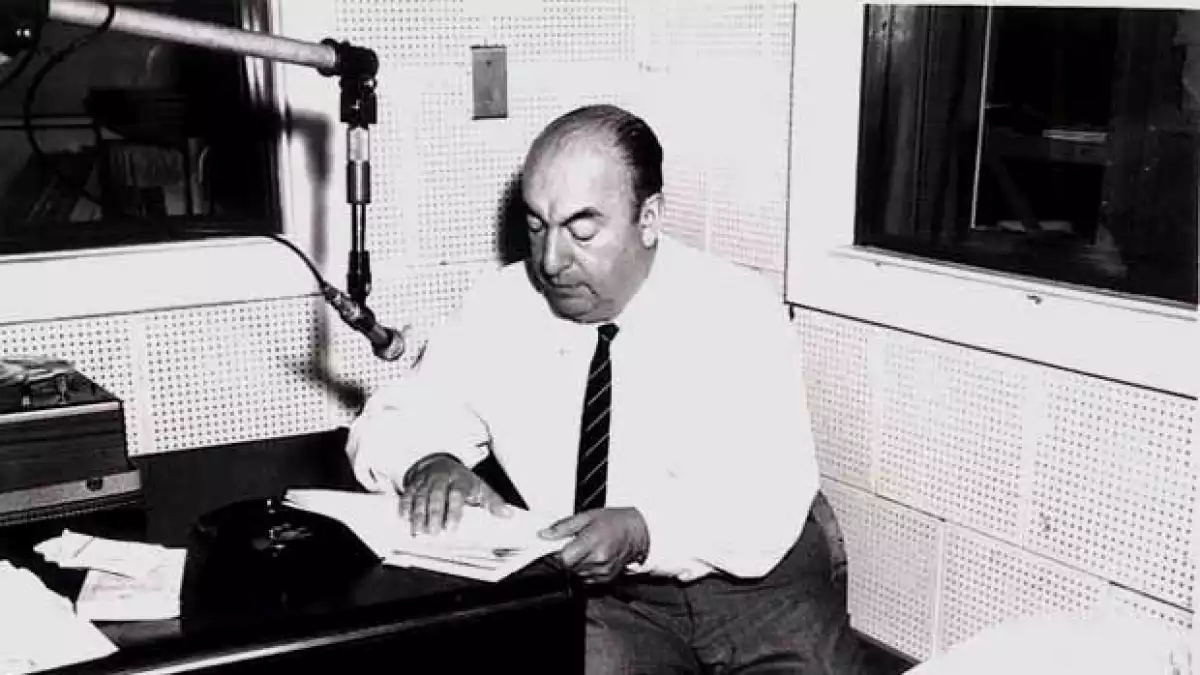
Oh, life,
clear cup,
suddenly
you fill up
with dirty water,
with dead wine,
with agony, with losses,
with overhanging spiderwebs,
and many believe
you will keep
that hellish color forever
It is not true.
A slow night passes,
a single minute passes
and everything changes.
The cup of life
brims
with translucence.
The spacious job
awaits us.
Doves are born in a lonesome burst.
Life on earth is established
Life, the poor
poets
thought you were bitter,
they did not rise
from bed with you,
with the wind of the world
They received beatings
without looking for you,
scuttled
a black hole
and began to drown
in the mourning
of a solitary well.
It is not true, life,
you are
beautiful
like my beloved
and between your breasts you distill
the smell of spearmint.
Life,
you are
a full machine,
happiness, sound
of a thunderstorm, tenderness
of delicate oil.
Life,
you are like a vineyard:
treasuring light, distributing it
remixed in clusters of grapes.
He who evades you
let him wait
a minute, a night,
a short year, a long one,
exit
his lying solitude,
let him inquire and fight, bring
his hands to other hands,
he should not adopt or flatter
misery,
let him reject it giving it
the shape of a wall,
like the stone to the stonemason,
let him cut misery
and turn it into
a pair of pants
Life awaits
us all
who love
the wild
perfume of the sea and the spearmint
it keeps between its breasts.
----------------------------------------
Ricardo Eliécer Neftalí Reyes Basoalto (12 July 1904 – 23 September 1973), known by his pen name Pablo Neruda, was a Chilean poet-diplomat and politician. Neruda's claim to fame happened at the age of 13 years old when he dazzled the literary world with his variety of styles, ranging from surrealist poems, historical epics, overtly political manifestos, a prose autobiography, and passionate love poems. He won the Nobel Prize for Literature in 1971. You can read the original version of Ode to life here.
2. Life - Charlotte Brontë
Life, believe, is not a dream
So dark as sages say;
Oft a little morning rain
Foretells a pleasant day.
Sometimes there are clouds of gloom,
But these are transient all;
If the shower will make the roses bloom,
O why lament its fall?
Rapidly, merrily,
Life’s sunny hours flit by,
Gratefully, cheerily
Enjoy them as they fly!
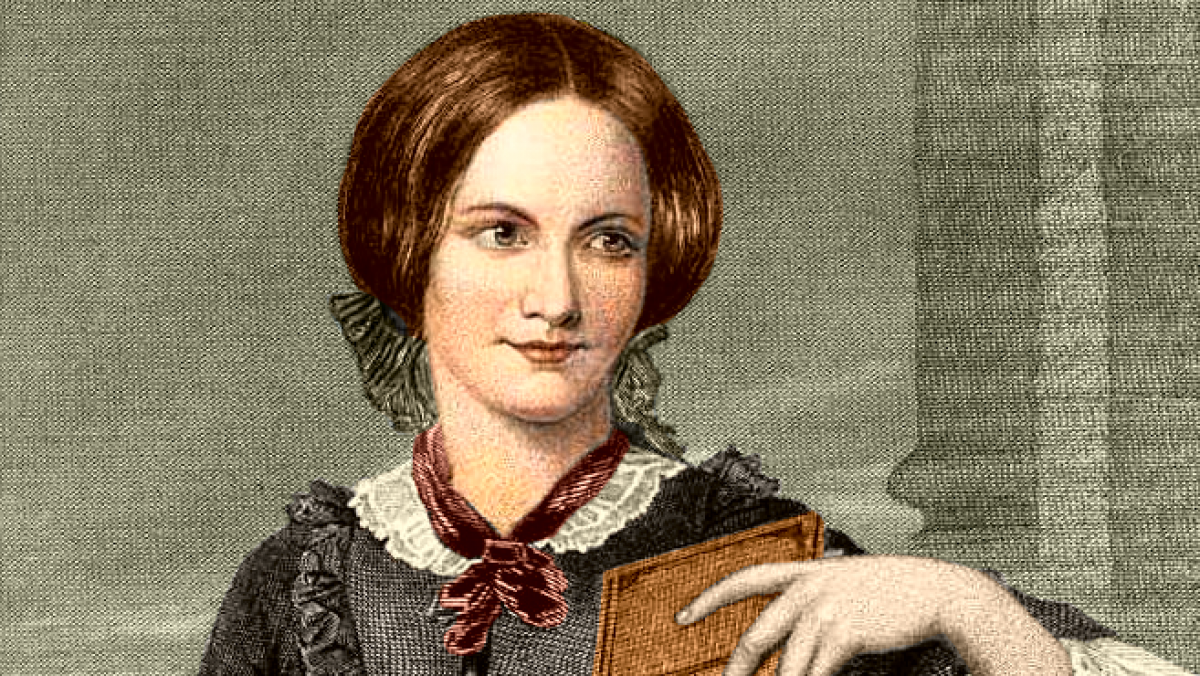
What though Death at times steps in,
And calls our Best away?
What though sorrow seems to win,
O’er hope, a heavy sway?
Yet Hope again elastic springs,
Unconquered, though she fell;
Still buoyant are her golden wings,
Still strong to bear us well.
Manfully, fearlessly,
The day of trial bear,
For gloriously, victoriously,
Can courage quell despair!
----------------------------------------
Charlotte Brontë (April 1816 – 31 March 1855) was an English novelist and poet, the eldest of the three Brontë sisters who survived into adulthood and whose novels became classics of English literature.
3. Life in a Love - Robert Browning
Escape me?
Never
Beloved!
While I am I, and you are you,
So long as the world contains us both,
Me the loving and you the loth,
While the one eludes, must the other pursue.
My life is a fault at last, I fear:
It seems too much like a fate, indeed!
Though I do my best I shall scarce succeed.
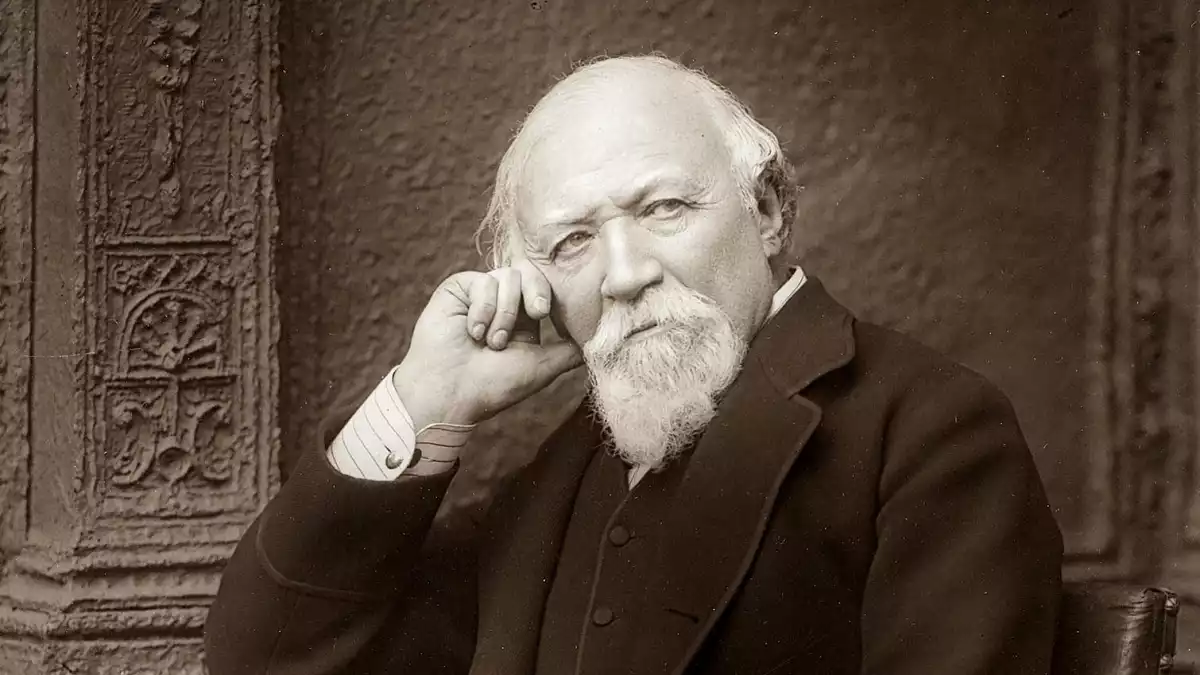
But what if I fail of my purpose here?
It is but to keep the nerves at strain,
To dry one's eyes and laugh at a fall,
And, baffled, get up and begin again,—
So the chase takes up one's life, that's all.
While look but once from your farthest bound
At me so deep in the dust and dark,
No sooner the old hope goes to ground
Than a new one, straight to the self-same mark,
I shape me—
Ever
Removed!
----------------------------------------
Robert Browning (7 May 1812 – 12 December 1889), English poet and playwright whose excellence in the dramatic monologue made him one of the most acclaimed Victorian poets. His work, primarily his poems are known for their irony, characterization, dark humor, social commentary, historical settings, and challenging vocabulary and syntax.
4. O Me! O Life! - Walt Whitman
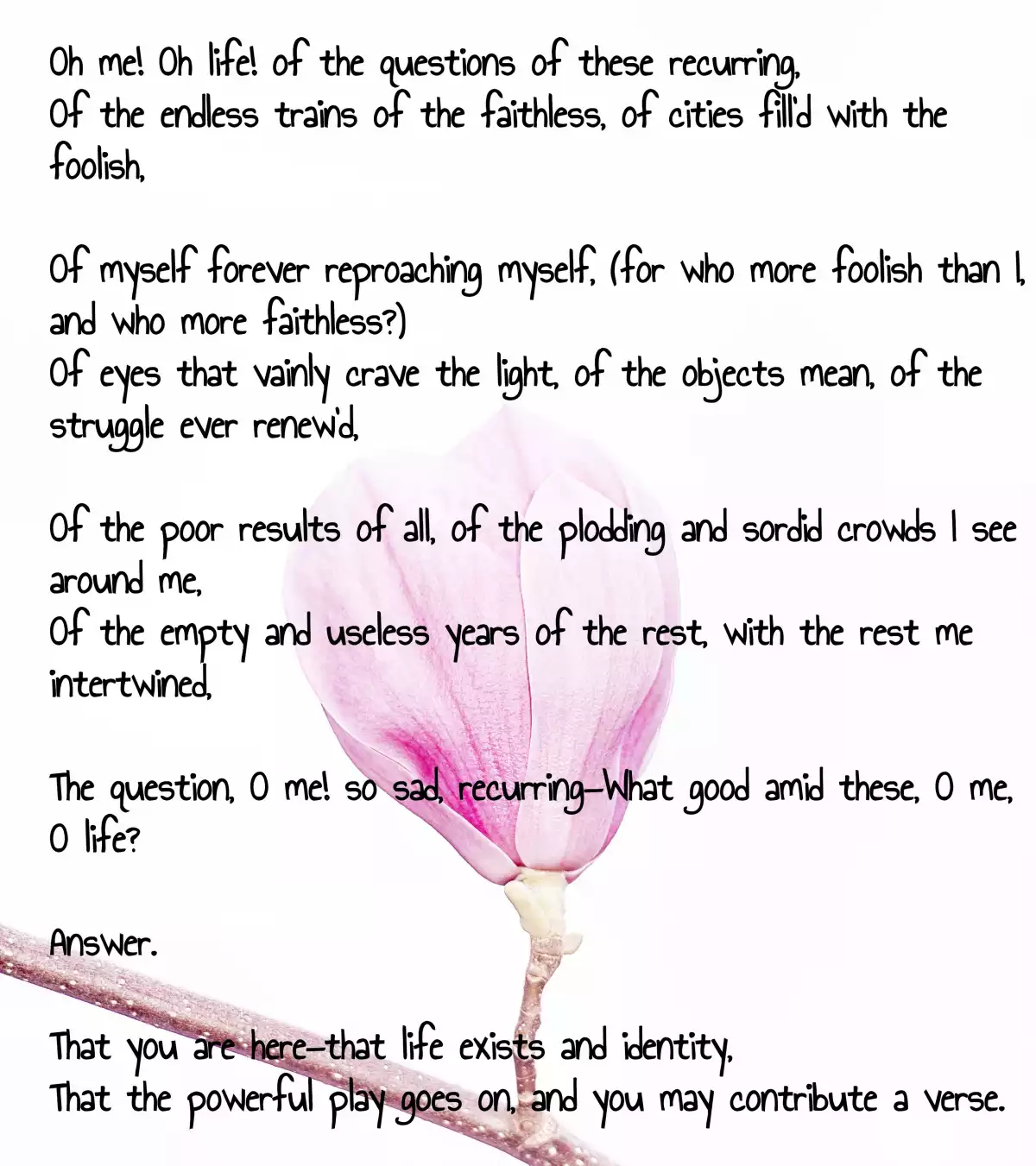
Born in Long Island, Whitman worked as a journalist, a teacher, a government clerk, and, aside from publishing his poetry, was a volunteer nurse during the American Civil War.
5. If - Rudyard Kipling
If you can keep your head when all about you
Are losing theirs and blaming it on you,
If you can trust yourself when all men doubt you,
But make allowance for their doubting too;
If you can wait and not be tired by waiting,
Or being lied about, don’t deal in lies,
Or being hated, don’t give way to hating,
And yet don’t look too good, nor talk too wise:
If you can dream—and not make dreams your master;
If you can think—and not make thoughts your aim;
If you can meet with Triumph and Disaster
And treat those two impostors just the same;
If you can bear to hear the truth you’ve spoken
Twisted by knaves to make a trap for fools,
Or watch the things you gave your life to, broken,
And stoop and build ’em up with worn-out tools:
If you can make one heap of all your winnings
And risk it on one turn of pitch-and-toss,
And lose, and start again at your beginnings
And never breathe a word about your loss;
If you can force your heart and nerve and sinew
To serve your turn long after they are gone,
And so hold on when there is nothing in you
Except the Will which says to them: ‘Hold on!’
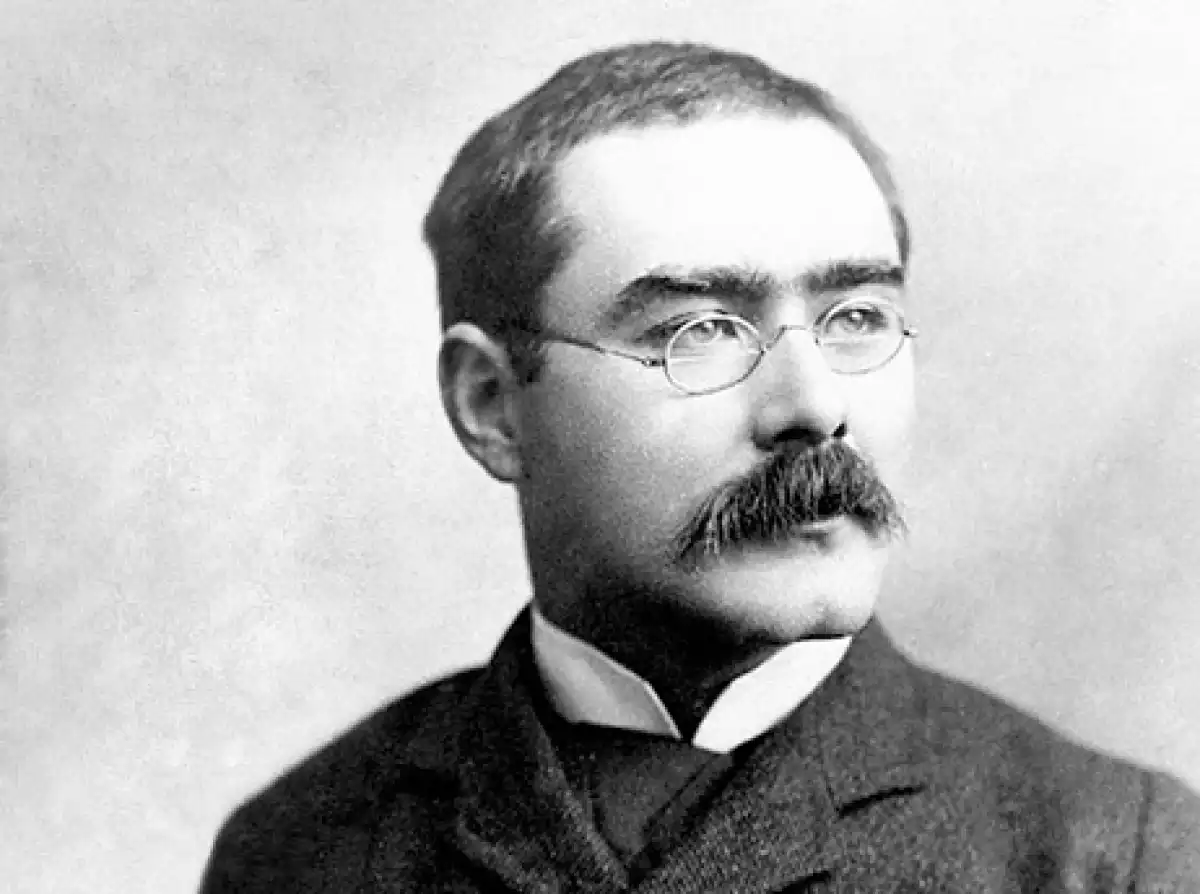
If you can talk with crowds and keep your virtue,
Or walk with Kings—nor lose the common touch,
If neither foes nor loving friends can hurt you,
If all men count with you, but none too much;
If you can fill the unforgiving minute
With sixty seconds’ worth of distance run,
Yours is the Earth and everything that’s in it,
And—which is more—you’ll be a Man, my son!
----------------------------------------
Kipling was one of the most popular writers in the United Kingdom, in both prose and verse, in the late 19th and early 20th centuries. In 1907, at the age of 41, he was awarded the Nobel Prize in Literature, making him the first English-language writer to receive the prize and one of the youngest recipients to date.
6. Death - W.B. Yeats
Nor dread nor hope attend
A dying animal;
A man awaits his end
Dreading and hoping all;
Many times he died
Many times rose again,
A great man in his pride
Confronting murderous men
Casts derision upon
Supersession of breath;
He knows death to the bone
Man has created death.
----------------------------------------
William Butler Yeats (13 June 1865 – 28 January 1939) was an Irish poet and one of the foremost figures of 20th-century literature. Yeats' style of writing was symbolistic; he used allusive imagery and symbolic structures throughout his career.
7. What Is Life? - Samuel Taylor Coleridge
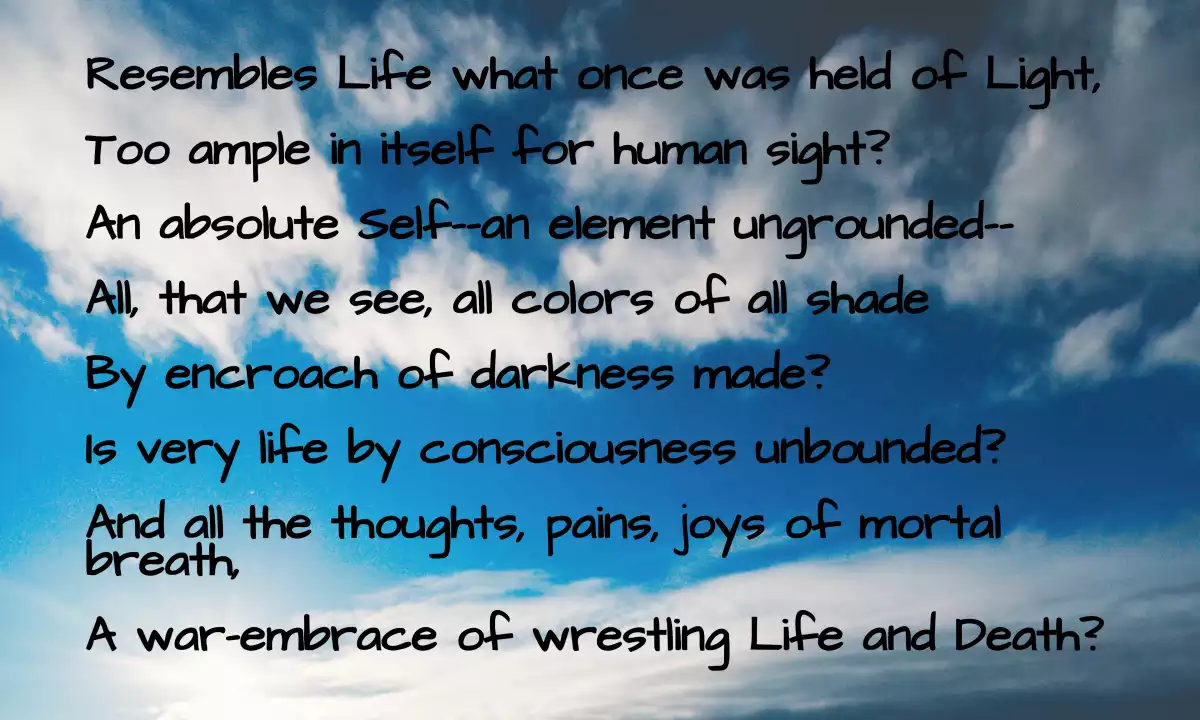
Coleridge's critical work, especially on William Shakespeare was extremely influential. Coleridge coined many familiar words and phrases, including suspension of disbelief. He had a major influence on Ralph Waldo Emerson and on American transcendentalism.
8. All The World's A Stage - William Shakespeare
All the world's a stage,
And all the men and women merely players:
They have their exits and their entrances;
And one man in his time plays many parts,
His acts being seven ages. At first, the infant,
Mewling and puking in the nurse's arms.
And then the whining school-boy, with his satchel
And shining morning face, creeping like snail
Unwillingly to school. And then the lover,
Sighing like furnace, with a woeful ballad
Made to his mistress' eyebrow. Then a soldier,
Full of strange oaths and bearded like the pard,
Jealous in honour, sudden and quick in quarrel,
Seeking the bubble reputation
Even in the cannon's mouth. And then the justice,
In fair round belly with good capon lined,
With eyes severe and beard of formal cut,
Full of wise saws and modern instances;
And so he plays his part. The sixth age shifts
Into the lean and slipper'd pantaloon,
With spectacles on nose and pouch on side,
His youthful hose, well saved, a world too wide
For his shrunk shank; and his big manly voice,
Turning again toward childish treble, pipes
And whistles in his sound. Last scene of all,
That ends this strange eventful history,
Is second childishness and mere oblivion,
Sans teeth, sans eyes, sans taste, sans everything.
----------------------------------------
William Shakespeare (26 April 1564 – 23 April 1616) was an English poet, playwright, and actor, widely regarded as the greatest writer in the English language and the world's greatest dramatist. He is often called England's national poet and the "Bard of Avon".
9. Dreams - Langston Hughes
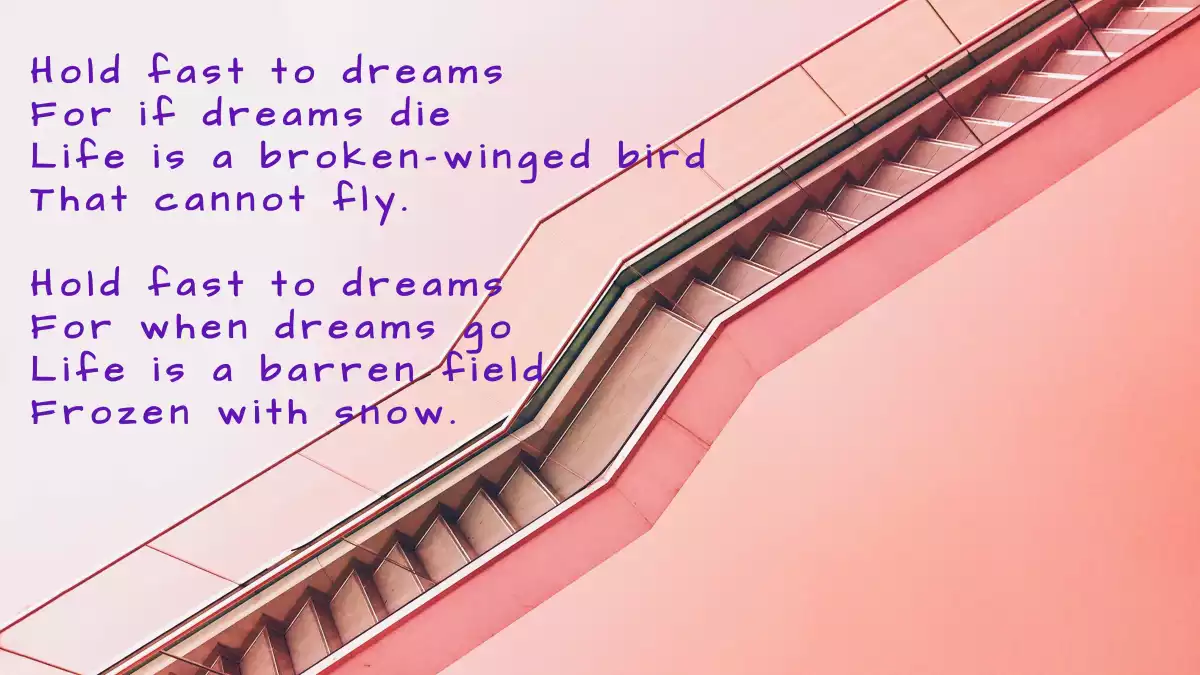
James Mercer Langston Hughes (February 1, 1902 – May 22, 1967) was an American poet, and one of the earliest innovators of the literary art form called jazz poetry.
10. Invictus - William Ernest Henley
Out of the night that covers me,
Black as the pit from pole to pole,
I thank whatever gods may be
For my unconquerable soul.
In the fell clutch of circumstance
I have not winced nor cried aloud.
Under the bludgeonings of chance
My head is bloody but unbowed.
Beyond this place of wrath and tears
Looms but the Horror of the shade,
And yet the menace of the years
Finds and shall find me unafraid.
It matters not how strait the gate,
How charged with punishments the scroll,
I am the master of my fate,
I am the captain of my soul.
----------------------------------------
William Ernest Henley (23 August 1849 – 11 July 1903) was an influential English poet, and critic. The poem Invictus (meaning “unconquerable” or “undefeated” in Latin) poem is about courage in the face of death and holding on to one's dignity despite the indignities life places before us.

